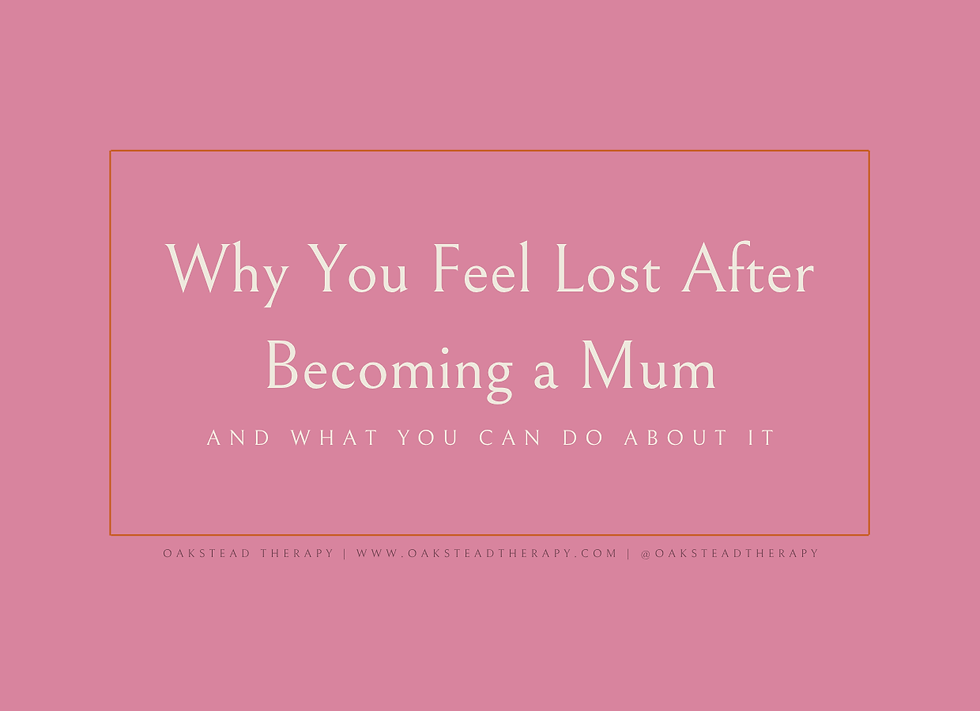5 Common Mental Health Challenges New Mothers Face
- Claire Smith

- Jul 5, 2025
- 3 min read
Updated: Aug 1, 2025

Becoming a mother is often described as one of life's most rewarding experiences - but it's also one of the most challenging, in ways that people don't always talk about. While there's plenty of advice on how to care for your newborn, there's often less conversation about how to care for you.
The truth is, many new mothers face mental health challenges in the months and years after giving birth. If you're feeling overwhelmed, anxious, sad, or unlike yourself, you're not alone - and you're not doing anything wrong.
Postnatal Anxiety
While most people have heard of postnatal depression, postnatal anxiety is just as common - and sometimes overlooked. New mothers experiencing postnatal anxiety often describe:
Racing thoughts that feel impossible to switch off
Intense worry about their baby's health, safety, or development
Feeling tense, restless, or 'on edge'
Trouble sleeping, even when the baby is asleep
Physical symptoms like a racing heart, dizziness, or nausea
Postnatal anxiety can feel all-consuming, and mothers often keep it to themselves out of fear they'll be seen as overreacting. But this type of anxiety is very real, and help is available.
What Can Help:
Talking openly with a trusted health professional
Mindfulness and grounding techniques
Learning to differentiate helpful vs. unhelpful worry
Therapy focused on managing anxiety and building coping strategies
Postnatal Depression
Postnatal Depression (PND) goes beyond the 'baby blues', which are typically short-lived and resolve within the first couple of weeks after birth. Postnatal depression lingers and can deeply affect your emotional well-being.
Common signs include:
Persistent sadness or low mood
Feeling numb or disconnected from your baby or your life
Loss of interest in things you usually enjoy
Changes in appetite, sleep, or energy
Feelings of guilt, hopelessness, or worthlessness
PND can make mothers feel isolated, ashamed, or as though they're 'failing' - but the reality is, this is a medical condition, not a personal flaw.
What Can Help:
Counselling or psychological therapy
Medical support through your GP or maternal health provider
Building a supportive village around you - friends, family, support groups
Adjustment Difficulties
The transition to motherhood can feel like a full-body identity shift. Even when a baby is deeply wanted, the adjustment can be emotionally complex.
You may feel:
Overwhelmed by the constant needs of your baby
A sense of loss for your 'old life' or past self
Uncertainty about who you are now outside of motherhood
Frustration at how much mental space is taken up by things you didn't anticipate
This challenge is often underestimated. It's not just about practical changes - it's about learning how to exist in this new version of your life.
What Can Help:
Giving yourself permission to grieve and adapt at your own pace
Talking with other mothers who can normalise the experience
Working with a therapist to explore identity, roles, and self-worth in motherhood.
Mum Guilt
Mum guilt is relentless for so many mothers. It whispers:
"You're not doing enough."
"You're doing it wrong."
"You should be grateful, not struggling."
Mum guilt can show up around:
How you feed your baby (bottle, breast, mix)
Whether you go back to work
Taking time for yourself
Feeling frustrated, exhausted, or needing help
The thing is, mum guilt thrives on impossible standards. It convinces mothers that perfection is the only acceptable outcome - when in reality, what your child needs most is a good-enough, loving, human mum.
What Can Help:
Challenging the unrealistic expectations you hold for yourself
Learning self-compassion and the skill of 'talking to yourself like you would a friend'
Finding supportive spaces where mum guilt is understood, not dismissed
Relationship Strain
Having a baby can deeply impact relationships. Even the strongest partnerships can feel stretched by:
Sleep deprivation
New responsibilities and changing dynamics
Less time for emotional connect or intimacy
Different parenting styles or expectations
Many mothers feel like they've lost their teammate in the chaos of early parenting. It's easy to fall into patterns of resentment, miscommunication, or emotional distance.
What Can Help:
Honest, regular check-ins with your partner
Couples counselling to rebuild connection and understanding
Finding small ways to reconnect, even when time is limited
Final Thoughts: You Are Not Alone
Motherhood is a complex, life-changing journey. If you're struggling, it doesn't mean you're doing a bad job - it means you're human, and you deserve support.
Your mental health matters just as much as your baby's wellbeing. Your needs are important.
And you don't have to carry it all alone.
If you're ready to find support, whether though one-on-one counselling or workshops, I'd love to talk alongside you.
You are doing better than you think, mumma.




Comments